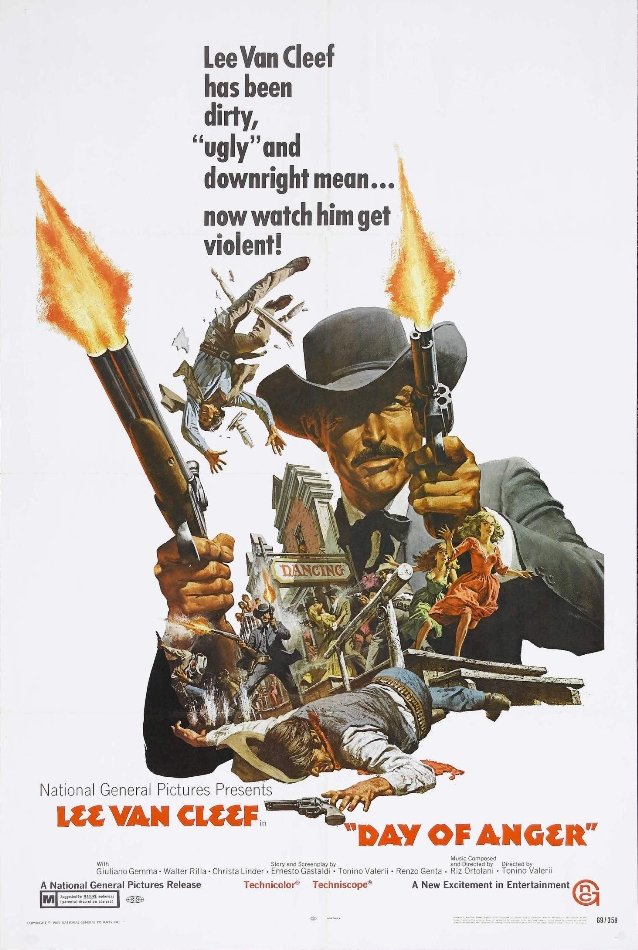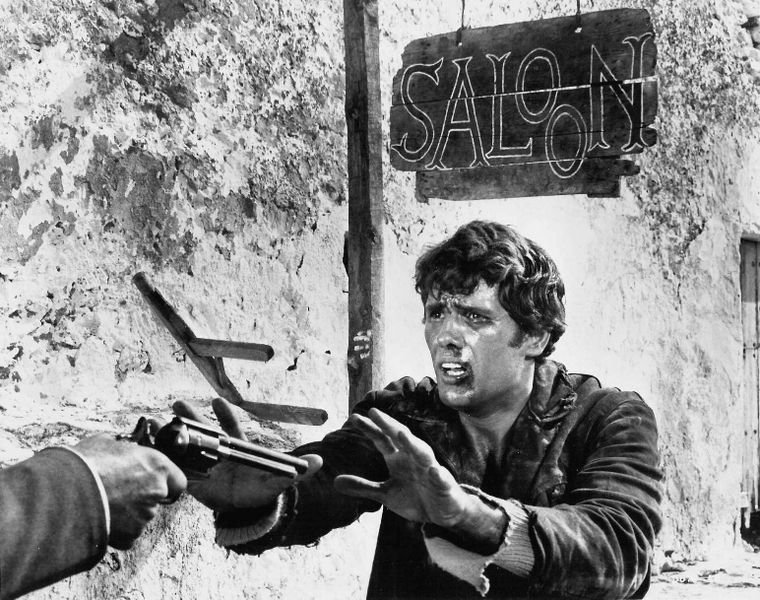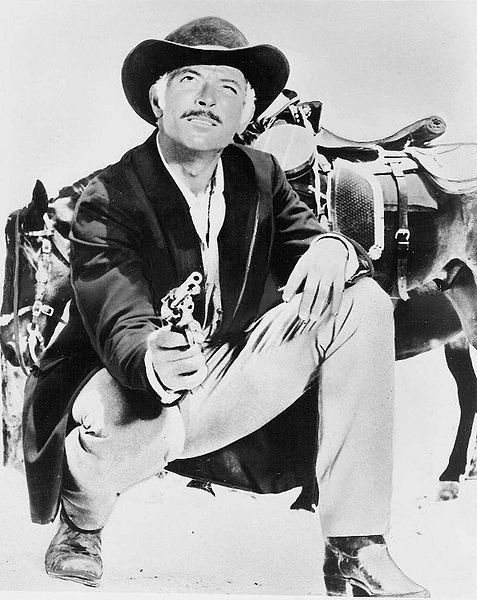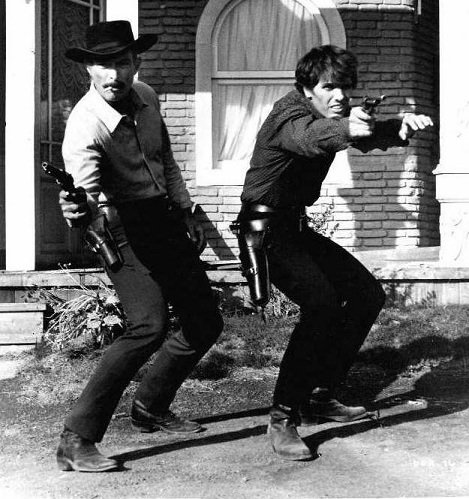DAY OF ANGER: The Good, The Bad And The Oedipal
When people talk about the ambitious side of the spaghetti western, talk usually revolves around the politically-themed examples of this genre. This is done with good reason as there are many fine spaghetti westerns with complex political themes like A Bullet For The General or Duck, You Sucker. However, spaghetti westerns can also display a similar level of ambition in their approach to psychological themes. A great example of this type of spaghetti western is Day Of Anger, an ambitious piece of work that uses an Oedipal mindset to comment on the relationships between its male characters. Day Of Anger has two protagonists. The first is Scott (Giuliano Gemma), a young man who is scorned by his town for being born out of wedlock. His fondest dream is to become a gunslinger and earn respect. This dream suddenly becomes possible when Frank Talby (Lee Van Cleef) rides into town. Talby takes Scott under his wing and begins teaching him the art of gunslinging as he sets a revenge plot into motion against the same town leaders who treat Scott like a slave.Scott picks up shooting skills quickly and gains a measure of self-respect. However, the town leaders aren't going down without a fight and he must keep his guard up against their treachery. A challenge of different sort arises when Scott's former mentor, stable keeper Murph (Walter Rilla), points out that Talby might not have Scott's best interests at heart.
Day Of Anger has two protagonists. The first is Scott (Giuliano Gemma), a young man who is scorned by his town for being born out of wedlock. His fondest dream is to become a gunslinger and earn respect. This dream suddenly becomes possible when Frank Talby (Lee Van Cleef) rides into town. Talby takes Scott under his wing and begins teaching him the art of gunslinging as he sets a revenge plot into motion against the same town leaders who treat Scott like a slave.Scott picks up shooting skills quickly and gains a measure of self-respect. However, the town leaders aren't going down without a fight and he must keep his guard up against their treachery. A challenge of different sort arises when Scott's former mentor, stable keeper Murph (Walter Rilla), points out that Talby might not have Scott's best interests at heart. Day Of Anger is a unique spaghetti western experience because the characterizations are more important the plot itself. Indeed, the revenge elements of the storyline add the requisite excitement but act as a backdrop for an exploration of its two main characters. Scott goes through many changes as he learns from Talby and takes his destiny into his own hands, showing the viewer that experience brings wisdom but not necessarily happiness. Meanwhile, Talby's motivations are slowly revealed as he brings Scott into a world-weary view of life through an outlaw's eyes.The plot's surprises hinge upon these character-based revelations and give the usual gunplay and double crosses a new depth and motivation. It's also interesting to note how the mentor/student relationship between Scott and Talby plays out in Oedipal terms, with Scott being forced to
Day Of Anger is a unique spaghetti western experience because the characterizations are more important the plot itself. Indeed, the revenge elements of the storyline add the requisite excitement but act as a backdrop for an exploration of its two main characters. Scott goes through many changes as he learns from Talby and takes his destiny into his own hands, showing the viewer that experience brings wisdom but not necessarily happiness. Meanwhile, Talby's motivations are slowly revealed as he brings Scott into a world-weary view of life through an outlaw's eyes.The plot's surprises hinge upon these character-based revelations and give the usual gunplay and double crosses a new depth and motivation. It's also interesting to note how the mentor/student relationship between Scott and Talby plays out in Oedipal terms, with Scott being forced to  throw off his idealized notions of what Talby represents to be able to move forward on his own terms.The direction by Sergio Leone protégé Tonino Valerii, who also co-wrote the script with Ernesto Gastaldi, plays with genre conventions in a similarly pointed way. He is able to deploy Leone-styled framing and staging when it suits the story's needs: a great example is a taut, carefully edited duel on horseback in which Talby and a rival gunman use front-loading rifles to face off. That said, he is equally capable of deflating stylization i
throw off his idealized notions of what Talby represents to be able to move forward on his own terms.The direction by Sergio Leone protégé Tonino Valerii, who also co-wrote the script with Ernesto Gastaldi, plays with genre conventions in a similarly pointed way. He is able to deploy Leone-styled framing and staging when it suits the story's needs: a great example is a taut, carefully edited duel on horseback in which Talby and a rival gunman use front-loading rifles to face off. That said, he is equally capable of deflating stylization i n a way that bolsters his themes. This really comes into play in the finale, which plays up the grim, cold nature of violence and doesn't offer an easy denouement for anyone involved.Finally, and most importantly, Day Of Anger is anchored by a pair of stellar lead performances. Gemma handles his progression from likeable naïf to grizzled veteran outlaw with expressive skill, investing himself completely in the slow curdling of emotions that the character experiences as he makes his way to wisdom. Van Cleef balances the film's emotional see-saw with a performance that is charismatic while preserving the mystery of his character's intentions. He's also able to bring a bemused world-weariness to his work, an aspect that shines when he takes the opportunity to deflate the hypocrisy of the town leaders.In short, Day Of Anger is a classic of the spaghetti western because it uses the genre's archetypal elements as the vehicle for its own interesting psychological explorations. There's more to this genre than politics and this film shows the rich variations that smart craftsmen were able to extract from its archetypes.
n a way that bolsters his themes. This really comes into play in the finale, which plays up the grim, cold nature of violence and doesn't offer an easy denouement for anyone involved.Finally, and most importantly, Day Of Anger is anchored by a pair of stellar lead performances. Gemma handles his progression from likeable naïf to grizzled veteran outlaw with expressive skill, investing himself completely in the slow curdling of emotions that the character experiences as he makes his way to wisdom. Van Cleef balances the film's emotional see-saw with a performance that is charismatic while preserving the mystery of his character's intentions. He's also able to bring a bemused world-weariness to his work, an aspect that shines when he takes the opportunity to deflate the hypocrisy of the town leaders.In short, Day Of Anger is a classic of the spaghetti western because it uses the genre's archetypal elements as the vehicle for its own interesting psychological explorations. There's more to this genre than politics and this film shows the rich variations that smart craftsmen were able to extract from its archetypes.


